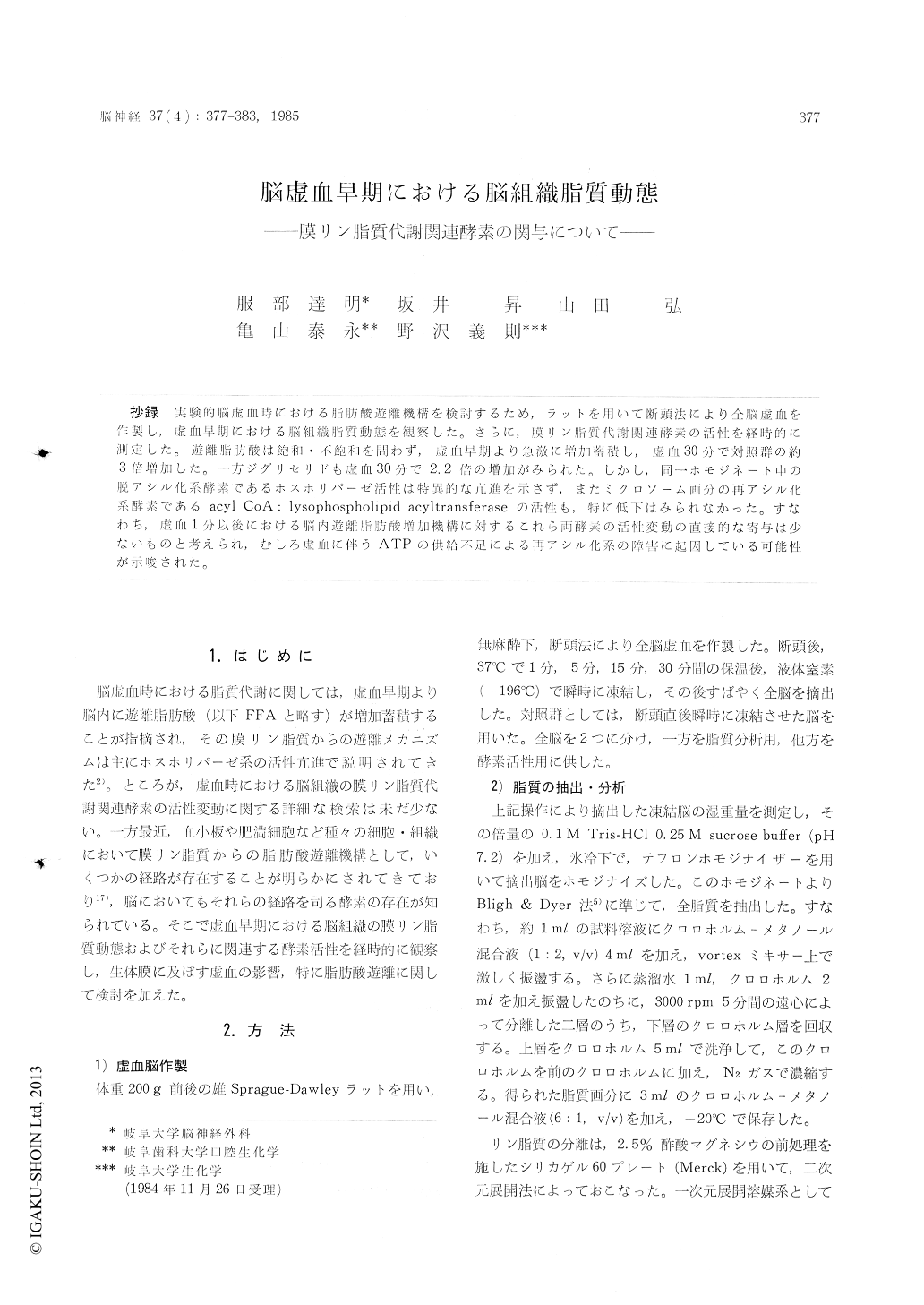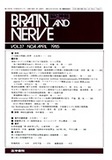Japanese
English
- 有料閲覧
- Abstract 文献概要
- 1ページ目 Look Inside
抄録 実験的脳虚血時における脂肪酸遊離機構を検討するため,ラットを用いて断頭法により全脳虚血を作製し,虚血早期における脳組織脂質動態を観察した。さらに,膜リン脂質代謝関連酵素の活性を経時的に測定した。遊離脂肪酸は飽和・不飽和を問わず,虚血早期より急激に増加蓄積し,虚血30分で対照群の約3倍増加した。一方ジグリセリドも虚血30分で2.2倍の増加がみられた。しかし,同一ホモジネート中の脱アシル化系酵素であるホスホリパーゼ活性は特異的な亢進を示さず,またミクロソーム画分の再アシル化系酵素であるacyl CoA:lysophospholipid acyltransferaseの活性も,特に低下はみられなかった。すなわち,虚血1分以後における脳内遊離脂肪酸増加機構に対するこれら両酵素の活性変動の直接的な寄与は少ないものと考えられ,むしろ虚血に伴うATPの供給不足による再アシル化系の障害に起因している可能性が示唆された。
It is generally known that free fatty acids (FFA) are liberated from membrane phospholipids in the brain tissue during the early period of ischemia. However, the precise mechanism of FFA liberation from phospholipids is still unclear, eventhough it is a central topic of neurosurgery. As an initial step toward a better understanding of the molecular mechanism, we have investigated the effects of global ischemia upon brain lipid metabolism.
Brain ischemia was evoked by rat decapitation whithout anesthesia. Removed brains were incuba-ted for 1, 5, 15 or 30 min at 37℃ and then quickly frozen in liquid nitrogen. After extraction of total lipids from the brains by Bligh & Dyer's method, the compositions of neutral lipids and phospholi-pids were analyzed by thin-layer and gas-liquid chromatography. For assaying deacylating enzyme (phospholipase A) activity, the brain homogenate was used as a crude enzyme. The reaction mixture including radioactive substrate, buffer (pH 7.3 & 4.0) and enzyme was incubated for 1 hour at 37 ℃. Lipids were extracted from reaction mixture and separated by TLC. The enzyme activity was estimated by measuring the radioactivity in FFA or lysophosphatidylcholine liberated from L-oc-di [1-14C] palmitoyl phosphatidylcholine. The reac-tion mixture for the assay of reacylating enzyme (acyl CoA : lysophospholipid acyltransferase) acti-vity, contained acyl CoA, lysophosphatidylcholine, DTNB and microsomes, and the enzyme activity was determined by the amount of released CoA-SH detected spectrophotometrically.
The results demonstrated that FFA, either unsa-turated or saturated, rapidly accumulated in the brain during the early period of ischemia. Di-acylglycerols were also produced in the ischemic brain. To gain insight into the source of the libe-rated FFA, the fatty acid compositions of each membrane phospholipid were analyzed, but the obtained results were unable to lead us to a clear conclusion. The phospholipase A activity was found to show no significant increase, and acyl CoA : lysophospholipid acyltransferase activity was not decreased during ischemia. These observations suggest that changes in the activities of enzymes related to membrance phospholipid metabolism may not play a crucial role in FFA accumulation associated with brain ischemia, and also that the deterioration of reacylation due to deficient ATP supply might be implicated.

Copyright © 1985, Igaku-Shoin Ltd. All rights reserved.


